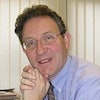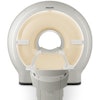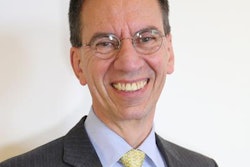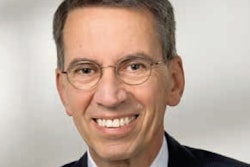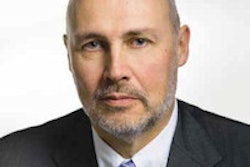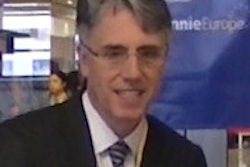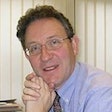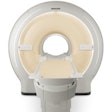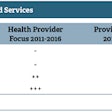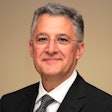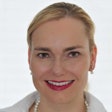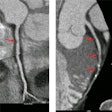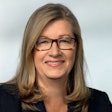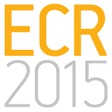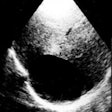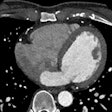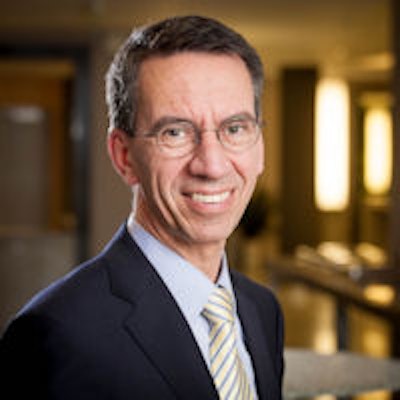
Never lose focus. That's one of Dr. Bernd Hamm's personal philosophies. Even as a child, he knew where he was going. Obviously he hadn't a clue as to where his path would take him, but such a degree of confidence in a person can make quite an impression. Hamm is no dreamer.
"It seems that when I was a 7 year old, I wanted to be a policeman or a tram driver, but it soon became clear that I wanted to study for the profession which my father had practiced with such enthusiasm: radiology," he said.
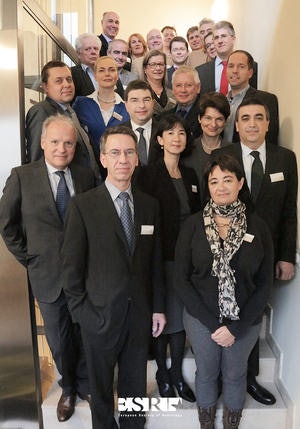 Planning ECR 2015 is such a huge task that it requires a large organizing committee. Congress President Dr. Bernd Hamm is in the front row of the photo. All images courtesy of the European Society of Radiology (ESR).
Planning ECR 2015 is such a huge task that it requires a large organizing committee. Congress President Dr. Bernd Hamm is in the front row of the photo. All images courtesy of the European Society of Radiology (ESR).In 1972, when Hamm embarked upon his studies at the Freie Universität Berlin [now called Medizinische Fakultät Charité - Universitätsmedizin Berlin / Medical School - Charité - University Medicine Berlin] in the Dahlem district of Berlin, entirely new horizons opened up before him. Generation Y, with its campaign for parental leave or sabbaticals, was yet to come. Student thinking in those days was very different from that of today's pupils. It was "all or nothing;" it was about "the system," about "society."
As a soon-to-be doctor, Hamm took an interest in general meetings, which he attended and at which he spoke. This curiosity may have led him to drop the odd lecture -- but he was still very good at getting his studying done within the normal allotted study period.
Were there really no other areas of medicine that were tempting? He goes on: "For a while, I was interested in pathology, but I also fancied urology and, most of all, surgery. Anyway, nowadays I am really happy to be working with surgeons -- they really do tell things as they are! But radiology -- that is the most fascinating of them all."
Hamm was not a man to dither. He had known from early adolescence where he was heading; once he was at the Freie Universität Berlin, he finally made his mind up to start with abdominal radiology, then to move on to concentrate on the urology side and it was from there that he graduated. "Radiology is great -- the range of areas is so wide, there is so much to choose from," he added, enthusiastically.
His route seemed to be mapped out for him. Smooth sailing? "No. You must never give up hope and you need to have the courage to make decisions. As Charlie Chaplin said, 'At the crossroads of life there are no signposts.' "
Attractions of Berlin
It wasn't until after qualifying as a university lecturer and spending three years working as a senior consultant in the Nuclear Medicine Clinic at the Klinikum Steglitz (Steglitz Hospital, renamed Universitätsklinikum Benjamin Franklin [UKBF] in 1994) that Hamm found his way: he became a partner in a large radiology practice in Frankfurt am Main and also applied for the radiology chair at Essen University. It then came as somewhat of a surprise when he was appointed to this professorship.
At the same time, he made a successful application for appointment to the prestigious Charité radiology chair shortly after the Berlin Wall came down. In March 1993, he took up his post at the Charité Institute of Radiology. Later on, he was invited to apply for the W3 professorship in Frankfurt am Main, but he stayed at Charité.
This was the new, reunited Berlin, awakening Berlin.
"There is a saying from India that states: 'You don't want to go where there are already palaces, but where palaces are going to be built.' I continued to feel quite a magical attraction to Berlin. Nowadays, the city is even better known for its cosmopolitan and international nature, even though you still get a feeling of landing out in the sticks when you touch down at the city's airports," he quipped, with a twinkle in his eye.
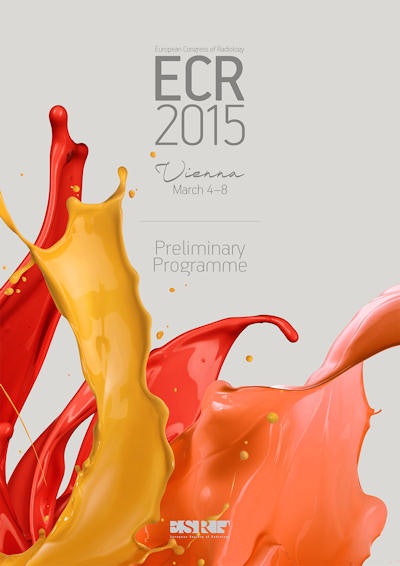 The ECR 2015 preliminary program is now available to download or view online. The congress will take place in Vienna from 4 to 8 March.
The ECR 2015 preliminary program is now available to download or view online. The congress will take place in Vienna from 4 to 8 March.Hamm likes quotations. There may be some uncertainty as to whether or not the German writer Theodor Fontane -- "In the eyes of God, all people are actually Berliners" -- was the guiding light behind his decision once he had passed his final school examinations, but one thing is absolutely certain: He made his way into what was then a divided city and it was this that led him to become a radiologist.
It had to be Berlin. It definitely had to be this divided city. Bernd Hamm was possessed by the urge to move to a big city after finishing high school. Born in Frankfurt am Main and raised in Königstein, in the Taunus, he was now ready to fly the sheltered nest and head for the huge adventure that was west Berlin in the 1970s.
The challenge of ECR
So is there nothing in his way, does he face no major challenges?
"There are always going to be obstacles. If you find yourself on your back, you just need to get back on your feet as quickly as possible. In March 2015, when I take over the ECR presidency in Vienna, I will really be facing a major undertaking and an exciting challenge," Hamm noted.
He has a real passion for the ECR 2015 theme: Radiology without borders. "Here and now, communication and dialogue are so important in these unsettled times, with an increasing focus on specialization. But this doesn't just apply to a congress as international as the ECR. It also applies to matters such as the contribution being made by the Akademie für Fort- und Weiterbildung in der Radiologie [Academy for Postgraduate and Continuous Training in Radiology] in establishing links and blurring boundaries."
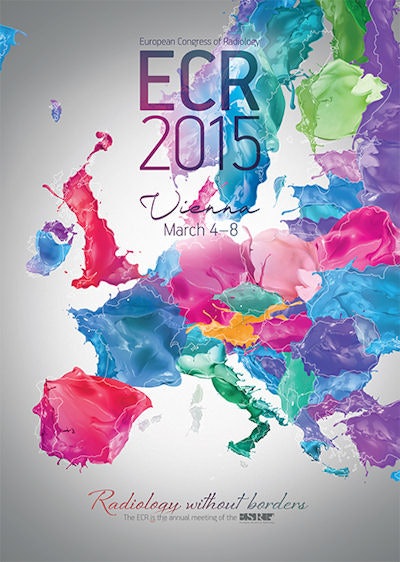 "Radiology without borders" is the central theme of ECR 2015.
"Radiology without borders" is the central theme of ECR 2015.So much empathy, such commitment. Is there any time left for personal interests? "A little. Skiing and sailing are my passions and I am in luck if I get to spend time enjoying them with my family. And obviously, where time permits, taking advantage of the enormous range of cultural interests that Berlin's calendar has to offer," he said.
His sons, both in their early 20s, have ended up studying engineering and medicine. Did he provide the impetus? "Obviously I'm not going to tell my children what they are meant to be doing." And the young radiologists at his clinic? "I generally like free thinkers. During staff appraisals, I often ask them what they want to be doing by the time they get to 40 and how they intend to get there. They should then be able to see just how they can achieve that."
Editor's note: This is an edited version of a translation of an article published online on 16 September 2014 in German by the German Radiological Society (DRG). Translation by Syntacta Translation & Interpreting.
